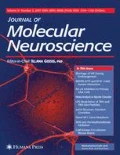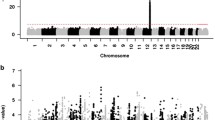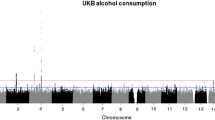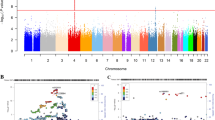Abstract
Variants (such as rs9939609) in the fat mass- and obesity-associated (FTO) gene have been associated with obesity, type 2 diabetes, some cancers, and alcohol consumption. This study tested the associations of 167 single-nucleotide polymorphisms (SNPs) within FTO gene with alcohol dependence (AD) using two Caucasian samples: the Collaborative Study on the Genetics of Alcoholism (COGA) sample (660 AD cases and 400 controls) and the Study of Addiction: Genetics and Environment (SAGE) sample (623 cases and 1,016 controls). Logistic regression analysis of AD as a binary trait was performed using the PLINK software. For the SAGE sample, the top three SNPs showing associations with AD were rs8062891, rs1108086, and rs1420318 (p = 0.00088, 0.00086 and 0.00086, respectively). Two SNPs (rs12597786 and rs7204609) associated with AD in the SAGE sample (p = 0.017 and 0.034, respectively) were replicated in the COGA sample (p = 0.017 and 0.014, respectively). Through meta-analysis of two samples using PLINK, the top three SNPs associated with AD were rs8062891, rs12597786, and rs7204609 (p = 0.00064, 0.00076 and 0.0011, respectively). Haplotype analysis in the SAGE sample further supported the associations with AD in single-marker analysis. In addition, we found association of rs17817449 (which has a strong linkage disequilibrium with rs9939609) with AD in the SAGE sample (p = 0.00339). The findings provide evidence of joint intervention and prevention of AD and obesity.


Similar content being viewed by others
References
American Psychiatric Association (1994) Diagnostic and statistical manual of mental disorders (4th ed.) (DSM-IV). APA, Washington, D.C
American Psychiatric Association (2000) Diagnostic and statistical manual of mental disorders: DSM-IV-TR, 4th edn. American Psychiatric Association, Washington, D.C.
Barrett JC, Fry B, Maller J, Daly MJ (2005) Haploview: analysis and visualization of LD and haplotype maps. Bioinformatics 21:263–265
Barry D, Clarke M, Petry NM (2009) Obesity and its relationship to addictions: is overeating a form of addictive behavior. Am J Addict 18:439–451
Bierut LJ, Agrawal A, Bucholz KK, Doheny KF, Laurie C, Pugh E et al (2010) A genome-wide association study of alcohol dependence. Proc Natl Acad Sci U S A 107:5082–5087
Cecil JE, Tavendale R, Watt P, Hetherington MM, Palmer CN (2008) An obesity-associated FTO gene variant and increased energy intake in children. N Engl J Med 359:2558–2566
Davis C, Levitan RD, Muglia P, Bewell C, Kennedy JL (2004) Decision-making deficits and overeating: a risk model for obesity. Obes Res 12:929–935
Dina C, Meyre D, Gallina S, Durand E, Körner A, Jacobson P et al (2007) Variation in FTO contributes to childhood obesity and severe adult obesity. Nat Genet 39:724–726
Dlouhá D, Hubáček JA (2012) FTO gene and his role in genetic determination of obesity. Vnitr Lek 58(3):208–215
Dom G, D’haene P, Hulstijn W, Sabbe B (2006) Impulsivity in abstinent early- and late-onset alcoholics: differences in self-report measures and a discounting task. Addiction 101:50–59
Dong C, Sanchez LE, Price RA (2004) Relationship of obesity to depression: a family-based study. Int J Obes Relat Metab Disord 28(6):790–795
Dudbridge F (2008) Likelihood-based association analysis for nuclear families and unrelated subjects with missing genotype data. Hum Hered 66:87–98
Edenberg HJ, Koller DL, Xuei X, Wetherill L, McClintick JN, Almasy L et al (2010) Genome-wide association study of alcohol dependence implicates a region on chromosome 11. Alcohol Clin Exp Res 34:840–852
Frayling TM, Timpson NJ, Weedon MN, Zeggini E, Freathy RM, Lindgren CM et al (2007) A common variant in the FTO gene is associated with body mass index and predisposes to childhood and adult obesity. Science 316:889–894
Freathy RM, Timpson NJ, Lawlor DA, Pouta A, Ben-Shlomo Y, Ruokonen A et al (2008) Common variation in the FTO gene alters diabetes-related metabolic traits to the extent expected, given its effect on BMI. Diabetes 57(5):1419–1426
Fredriksson R, Hägglund M, Olszewski PK, Stephansson O, Jacobsson JA, Olszewska AM et al (2008) The obesity gene, FTO, is of ancient origin, upregulated during food deprivation and expressed in neurons of feeding-related nuclei of the brain. Endocrinology 149(5):2062–2071
Galanti K, Gluck ME, Geliebter A (2007) Test meal intake in obese binge eaters in relation to impulsivity and compulsivity. Int J Eat Disord 40:727–732
Gerken T, Girard CA, Tung YC, Webby CJ, Saudek V, Hewitson KS et al (2007) The obesity-associated FTO gene encodes a 2 oxoglutarate-dependent nucleic acid demethylase. Science 318:1469–1472
Harwood H (2000) Updating estimates of the economic costs of alcohol abuse in the United States: Estimates, update methods, and data. Report prepared by The Lewin Group for the National Institute on Alcohol Abuse and Alcoholism, 2000. Based on estimates, analyses, and data reported in Harwood, H.; Fountain, D.; and Livermore, G. The Economic Costs of Alcohol and Drug Abuse in the United States 1992. Report prepared for the National Institute on Drug Abuse and the National Institute on Alcohol Abuse and Alcoholism, National Institutes of Health, Department of Health and Human Services. National Institutes of Health, Rockville, MD
Hasin DS, Stinson FS, Ogburn E, Grant BF (2007) Prevalence, correlates, disability, and comorbidity of DSM-IV alcohol abuse and dependence in the United States. Arch Gen Psychiatry 64(7):830
Hubacek JA, Adamkova V, Dlouha D, Jirsa M, Šperl J, Tönjes A et al (2012) Fat mass and obesity associated (FTO) gene and alcohol intake. Addiction 107(6):1185–1186
James GA, Gold MS, Liu Y (2004) Interaction of satiety and reward response to food stimulation. J Addict Dis 23:23–37
Jia G, Fu Y, Zhao X, Dai Q, Zheng G, Yang Y et al (2011) N6-Methyladenosine in nuclear RNA is a major substrate of the obesity-associated FTO. Nat Chem Biol 7(12):885–887
Johnston E, Johnson S, McLeod P, Johnston M (2004) The relation of body mass index to depressive symptoms. Can J Public Health 95(3):179–183
Kalsi G, Prescott CA, Kendler KS, Riley BP (2009) Unraveling the molecular mechanisms of alcohol dependence. Trends Genet 25:49–55
Keller L, Xu W, Wang HX, Winblad B, Fratiglioni L, Graff C (2011) The obesity related gene, FTO, interacts with APOE, and is associated with Alzheimer's disease risk: a prospective cohort study. J Alzheimer's Dis 23(3):461–469
Kleiner KD, Gold MS, Frost-Pineda K, Lenz-Brunsman B, Perri MG, Jacobs WS (2004) Body mass index and alcohol use. J Addict Dis 23:105–118
Kusinska R, Górniak P, Pastorczak A, Fendler W, Potemski P, Mlynarski W et al (2012) Influence of genomic variation in FTO at 16q12.2, MC4R at 18q22 and NRXN3 at 14q31 genes on breast cancer risk. Mol Biol Rep 39(3):2915–2919
McGue M (1999) Phenotyping alcoholism. Alcohol Clin Exp Res 23:757–758
Myers A, Rosen JC (1999) Obesity stigmatization and coping: relation to mental health symptoms, body image, and self-esteem. Int J Obes Relat Metab Disord 23(3):221–230
Olszewski PK, Fredriksson R, Olszewska AM, Stephansson O, Alsiö J, Radomska KJ et al (2009) Hypothalamic FTO is associated with the regulation of energy intake not feeding reward. BMC Neurosci 10:129
Onyike CU, Crum RM, Lee HB, Lyketsos CG, Eaton WW (2003) Is obesity associated with major depression? Results from the Third National Health and Nutrition Examination Survey. Am J Epidemiol 158(12):1139–1147
Peters T, Ausmeier K, Dildrop R, Rüther U (2002) The mouse Fused toes (Ft) mutation is the result of a 1.6-Mb deletion including the entire Iroquois B gene cluster. Mamm Genome 13(4):186–188
Prescott CA, Kendler KS (1999) Genetic and environmental contributions to alcohol abuse and dependence in a population-based sample of male twins. Am J Psychiatry 156:34–40
Purcell S, Neale B, Todd-Brown K, Thomas L, Ferreira MA, Bender D et al (2007) PLINK: a tool set for whole-genome association and population-based linkage analyses. Am J Hum Genet 81(3):559–575
Qi L, Kang K, Zhang C, van Dam RM, Kraft P, Hunter D, Lee CH et al (2008) Fat mass-and obesity-associated (FTO) gene variant is associated with obesity: longitudinal analyses in two cohort studies and functional test. Diabetes 57(11):3145–3151
Roberts RE, Strawbridge WJ, Deleger S, Kaplan GA (2002) Are the fat more jolly? Ann Behav Med 24(3):169–180
Scuteri A, Sanna S, Chen WM, Uda M, Albai G, Strait J et al (2007) Genome-wide association scan shows genetic variants in the FTO gene are associated with obesity-related traits. PLoS Genet 3(7):e115
Simon GE, Von Korff M, Saunders K, Miglioretti DL, Crane PK, van Belle G et al (2006) Association between obesity and psychiatric disorders in the US adult population. Arch Gen Psychiatry 63(7):824–830
Sobczyk-Kopciol A, Broda G, Wojnar M, Kurjata P, Jakubczyk A, Klimkiewicz A et al (2011) Inverse association of the obesity predisposing FTO rs9939609 genotype with alcohol consumption and risk for alcohol dependence. Addiction 106(4):739–748
Stratigopoulos G, Padilla SL, LeDuc CA, Watson E, Hattersley AT, McCarthy MI et al (2008) Regulation of Fto/Ftm gene expression in mice and humans. Am J Physiol Regul Integr Comp Physiol 294:R1185–R1196
Treutlein J, Rietschel M (2011) Genome-wide association studies of alcohol dependence and substance use disorders. Curr Psychiatry Rep 13:147–155
Treutlein J, Cichon S, Ridinger M, Wodarz N, Soyka M, Zill P et al (2009) Genome-wide association study of alcohol dependence. Arch Gen Psychiatry 66:773–784
Trinko R, Sears RM, Guarnieri DJ, DiLeone RJ (2007) Neural mechanisms underlying obesity and drug addiction. Physiol Behav 91:499–505
Volkow ND, O’Brien CP (2007) Issues for DSM-V: should obesity be included as a brain disorder? Am J Psychiatry 164:708–710
Wang KS, Liu X, Zhang Q, Pan Y, Aragam N, Zeng M (2011) A meta-analysis of two genome-wide association studies identifies 3 new loci for alcohol dependence. J Psychiatr Res 45:1419–1425
Acknowledgments
Funding support for the (CIDR-COGA Study) was provided through the Center for Inherited Disease Research (CIDR) and the Collaborative Study on the Genetics of Alcoholism (COGA). The CIDR–COGA Study is a genome-wide association studies funded as part of the COGA. Assistance with phenotype harmonization and genotype cleaning, as well as with general study coordination, was provided by the COGA. Assistance with data cleaning was provided by the National Center for Biotechnology Information. Support for collection of datasets and samples was provided by the COGA (U10 AA008401). Funding support for genotyping, which was performed at the Johns Hopkins University Center for Inherited Disease Research, was provided by the NIH GEI (U01HG004438), the National Institute on Alcohol Abuse and Alcoholism, and the NIH contract "High throughput genotyping for studying the genetic contributions to human disease" (HHSN268200782096C). The datasets used for the analyses described in this manuscript were obtained from dbGaP at http://www.ncbi.nlm.nih.gov/sites/entrez?Db = gap through dbGaP accession number: phs000125.v1.p1. Funding support for the SAGE was provided through the National Institutes of Health (NIH) Genes, Environment and Health Initiative (GEI) grant U01 HG004422. SAGE is one of the GWAS funded as part of the GENEVA under GEI. Assistance with phenotype harmonization and genotype cleaning, as well as with general study coordination, was provided by the GENEVA Coordinating Center (grant U01 HG004446). Assistance with data cleaning was provided by the National Center for Biotechnology Information. Support for collection of datasets and samples was provided by COGA (grant U10 AA008401), COGEND (grant P01 CA089392), and FSCD (grant R01 DA013423). Funding support for genotyping, which was performed at the Johns Hopkins University Center for Inherited Disease Research, was provided by NIH GEI grant U01HG004438, the National Institute on Alcohol Abuse and Alcoholism, the National Institute on Drug Abuse, and the NIH contract “High throughput genotyping for studying the genetic contributions to human disease” (HHSN268200782096C). The datasets used for the analyses described in this manuscript were obtained from dbGaP at http://www.ncbi.nlm.nih.gov/projects/gap/cgibin/ study.cgi study_id = phs000092.v1.p1 through dbGaP accession number phs000092.v1.p.1. This study was approved by the Internal Review Board (IRB), East Tennessee State University.
Conflict of interest
The authors declare no conflict of interest.
Author information
Authors and Affiliations
Corresponding author
Electronic supplementary material
Below is the link to the electronic supplementary material.
Table S1
(XLS 60 kb)
Rights and permissions
About this article
Cite this article
Wang, L., Liu, X., Luo, X. et al. Genetic Variants in the Fat Mass- and Obesity-Associated (FTO) Gene are Associated with Alcohol Dependence. J Mol Neurosci 51, 416–424 (2013). https://doi.org/10.1007/s12031-013-0044-2
Received:
Accepted:
Published:
Issue Date:
DOI: https://doi.org/10.1007/s12031-013-0044-2




